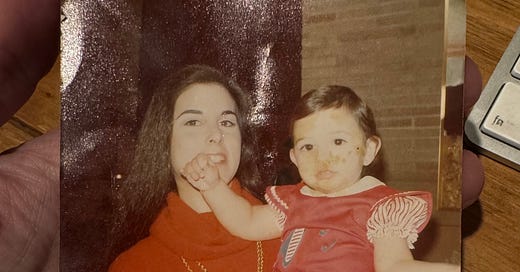I’ve always been intrigued with the notion of a palimpsest. I first heard the term in college. It refers to a written document where writing has been written on top of the original writing but bits of the original still show through.
I will find the real definition: a very old text or document in which writing has been removed and covered or replaced by new writing
It also means: something such as a work of art that has many levels of meaning, types of style, etc. that build on each other
(The above are from Cambridge Dictionary)
I was an obnoxious English major who analyzed and over-analyzed everything. I could wring meaning out of the most mundane exchanges. In college I was surrounded by people who were similarly wired but after college I was around people who found my overthinking exhausting: a sign of weakness or indecision.
I always blamed it on being an English major—being taught to analyze—but I think really I decided to be an English major because of my predilection for analysis.
I am getting off topic.
The above was just to explain where I first heard the term: in college, where I was pretentious and loved words. As opposed to now where I’m tired and love words.
The notion of a palimpsest was on my mind a lot this past week as my husband and I went through my late parents’ house, peeling back the layers of their life. Each level a seemingly different era.
The house was depressing AF. It was so much medical equipment. Boxes upon boxes of my dad’s catheters. A commode. My mom’s endless notepads of questions she wanted to ask her doctors.
I think you get a to a certain age and you’re seeing so many doctors and being treated for so much, and medicine has become balkanized, so you need to constantly fill the others in and make sure everyone is on the same page.
She had an oncologist, a pulmonologist and a cardiologist. Plus her the guy who read her X-rays and the guy who oversaw radiation and someone else I’m forgetting.
My mom was always a messy person but once she was diagnosed with cancer in 2010 it’s like she gave up. Papers and bills piled up on every horizontal surface. In fact, I actually thought this level of disorder was the way she lived so I was surprised to peel back the upper layers of papers—fifteen years of papers—and discover that at one point she did have a system. One that sort of confounds me, but a system nonetheless.
But still, going through this stuff did not bring me closer to my parents. This was the tedium of their life. The bills and maladies and stress.
The whole house was a bit of a wash. It was depressing. I felt sad.
And then we started in on the garage and I had a whole different experience. I’m still trying to figure out why. In the garage, confined to stacked bankers boxes that were stored up in the rafters, were signs of life. There were photos and diplomas. My sister’s and my dolls and old schoolwork. Even my mom’s old schoolwork.
Cards my mom wrote her mom (I’m assuming she took them back when her own parents died). The mom in those cards—then a teenager I’m guessing—was so different from the mom I knew.
And whereas I had found a few tiny notebooks that my mom used to keep track of purchases and phone numbers while abroad, turns out her parents had done this too because I found their tiny notebooks.
All the stuff from my mom’s mother (my grandmother) was heavily perfumed. A perfume I smelled as a child. But then in the midst of this I smelled another, younger and fresher scent. Could that have been my mom’s teenage perfume? I wish I could ask her.
There is so much I wish I could ask her.




